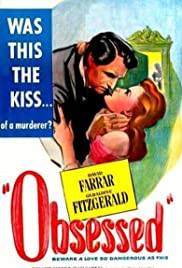
THE LATE EDWINA BLACK
UK, 1951, 78 minutes, Black-and-white.
David Farrar, Geraldine Fitzgerald, Roland Culver, Jean Cadell, Mary Merrall, Harcourt Williams.
Directed by Maurice Elvey.
The Late Edwina Black is based on a 1920s play and was filmed several times.
This version, from 1951, is directed by Maurice Elvey, a veteran director in British film from 1918 to 1958, mainly small films.
This is also a star vehicle for David Farrar, a stalwart of British films, especially Black Narcissus. Geraldine Fitzgerald had appeared in British films since the mid 1930s, including The Mill on the Floss, had moved to Hollywood where she had appeared in many Warner Brothers films including Dark Victory. Roland Culver was a character actor in both Hollywood and British films and is quite striking here as the rather sardonic police inspector from Scotland Yard. Jean Cadell has a strong role as the devoted maid.
The film opens with the death of Edwina Black and its influence on her husband and her maid. Her malevolent presence is felt after her death especially by her husband and the maid who were in love.
It emerges, with the visit of the inspector, that Edwina Black died of arsenic poison – which makes the couple suspicious of each other but, as audiences might have suspected, the malevolent Edwina poisoned herself to ruin the couple, all with the connivance of her devoted maid.
1. Based on a popular play from the 1920s? Theatrical? Dialogue and settings mainly interiors?
2. The late Victorian era, the house, the grounds and gardens, the town, the streets, bicycles, horse and buggies? The musical score?
3. The title, the focus on the dead woman? The sense of her presence? Her influence on the characters? The gradual revelation of the truth – but the audience sensing what happened quite early?
4. The household, the morning, Ellen, the call to Gregory, his going to his wife’s room, her death? His reaction, Elizabeth’s reaction, Ellen’s reaction? The visit of the doctor?
5. The funeral, in the house afterwards, the dowager concerned about Elizabeth and offering her a job? The minister? The atmosphere of the funeral?
6. Gregory and Elizabeth, the relationship, despite Edwina?
7. Gregory, character, place in the village, schoolmaster, the children at the funeral, his care for his wife? Relationship with Ellen? With Elizabeth?
8. Elizabeth, poor, her role as a maid, serving Edwina, in love with Gregory? Ellen’s hostility?
9. The action taking place over a couple of days? The tension, Edwina’s influence, the chimes, the atmosphere? The effect on Gregory and Elizabeth, their behaviour and betrayal of Edwina?
10. The inspector, his manner, giving of information, liking a cup of tea? The arsenic? The opinion of the doctor? The analyses? The issue of the weedkiller? Access? Elizabeth carrying up the milk? The hand powder and Gregory buying it, Elizabeth using it, losing it, the inspector finding it in the carriage?
11. The interactions between the two, their love, the brochure on Venice, five weeks before the death? Elizabeth and the suspicions, Gregory’s action, behaviour, lies, swearing on the dictionary? Gregory’s suspicions, Elizabeth, Venice, the milk? The tension between the two? The breakup?
12. The inspector, finding the powder, inviting himself in, the cup of tea, producing the container, Ellen’s reaction and fear?
13. The revelation of the truth, Ellen and her absolute devotion, her concealing Edwina’s behaviour? Gregory’s role in the timing? Getting Elizabeth to take up the milk? Edwina adding the poison, knowing that she was to die, her malicious death?
14. The tension between Gregory and Elizabeth, their reconciliation?